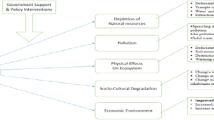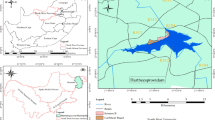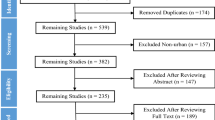Abstract
In developing countries, there is controversy over the correct perception regarding environmental and developmental issues. Few studies have examined the perception of low-income nationals in regards to social and environmental issues. This paper looks at the relationship between socio-demographic factors and the groups’ perceived priority regarding environmental and social issues in Wujin County. The results indicated that most residents, specifically the young, government employed and the urban community consider environmental issues to be serious, especially in relation to air pollution and water pollution. Furthermore, many residents feel it is important to rank environmental problems that are related to other social and economic issues, and that environmental protection must be set as a priority in Wujin County. Compared to social issues, environmental concern was greater among the young, government employed, and the urban community, because of their higher education and affluence. In addition, 66.2% of residents consider environmental protection to be more important than economic development. Thus, environmental protection must be set as a high priority in Wujin County, in order to face the many social and environmental challenges inherent in development.
Similar content being viewed by others
References
White M J, Hunter L M. Public Perception of Environmental Issues in a Developing Setting. Institute of Behavioral Science, Working Paper (EB2005-0003). 2005
Mitchell J K. Hazard perception studies: Convergent concerns and divergent approaches during the past decade. In: Saarinen T F, Seamom D, Sell J L, eds. Environmental Perception and Behavior: An Inventory and prospect Department of Geography. Chicago: The University of Chicago, 1984, 38–39
Curran S, Kumar A, Lutz W, Williams M. Interactions between coastal and marine ecosystems and human population systems: Perspectives on how consumption mediates this interaction. Ambio, 2002, 31: 264–268
National Research Council (NRC). Global Environmental Change: Research Pathways for the Next Decade. Washington DC: National Academies Press, 1999
Dunlap R E. Trends in Public Opinion Toward Environmental Issues: 1965–1990. Washington DC: Taylor and Francis, Inc., 1992
Mertig A G, Dunlap R E, Morrison D E. The environmental movement in the United States. In: Dunlap R E, Michelson W, eds. Handbook of Environmental Sociology. Westport, CT: Greenwood Press, 2002, 448–481
Jacob C T, Azariah J. Environmental perception of textile industrial pollution in Tiruppur, India. Journal of Asian and International Bioethics, 1997, 7: 162–165
Hunter L M. Household Strategies in the Face of Resource Scarcity: Are They Associated with Development Priorities. Working paper of Institute of Behavioral Science, Research Program on Environment and Behavior, EB2004-0001. 2004
Kempton W M, Boster J S, Hartley J A. Environmental Values in American Culture. Boston: MIT Press, 1995
Stern P C, Dietz T. The value basis of environmental concern. Journal of Social Issues, 1994, 50: 65–84
Dunlap R E, Mertig A G. Global concern for the environment: Is affluence a prerequisite? Journal of Social Issues, 1995, 51: 121–137
Rinzin C, Vermeulen W J, Glasbergen P. Public perceptions of Bhutan’s approach to sustainable development in practice. Sustainable Development, 2007, 15: 52–68
Inglehart R. Public support for environmental protection: Objective problems and subjective values in 43 societies. Political Science & Politics, 1995, 28: 57–72
Dunlap R E, York R. The globalization of environmental concern and the limits of the post-materialist values explanation: Evidence from four multi-national surveys. Sociological Quarterly, 2008, 49(3): 529–563
Brechin S R, Kempton W. Global environmentalism: A challenge to the poastmaterialsm thesis? Social Science Quarterly, 1994, 75 (2): 245–269
Dunlap R E, Gallup G H, Gallup A. Of global concern: Results of the health of the planet survey. Environment, 1993, 35: 33–39
Brechin S. Objective problems, subjective values, and global environmentalism: Evaluating the post-materialist argument and challenging a new explanation. Social Science Quarterly, 1999, 80: 793–811
Jones R E, Dunlap R E. The social bases of environmental concern: Have they changed over time? Rural Sociology, 1992, 57: 28–47
Klineberg S, McKeever L M, Rothenbach B. Demographic predictors of environmental concern: It does make a difference how it’s measured. Social Science Quarterly, 1998, 79 (4): 734–753
Dunlap R E, Xiao C, McCright A M. Measuring endorsement of the new ecological paradigm: A revised NEP scale. Journal of Social Issues, 2001, 56 (3): 425–442
Hunter LM, Johnson A, Hatch A. Cross-national gender variation in environmental behaviors. Social Science Quarterly, 2004, 85: 677–694
Zelezny L C, Chua P, Aldrich C. Elaborating on gender differences in environmentalism. Journal of Social Issues, 2000, 56: 443–457
Fransson N, Garling T. Environmental concern: Conceptual definitions, measurement methods, and research findings. Journal of Environmental Psychology, 1999, 19: 369–382
Biel A, Nilsson A. Religious values and environmental concern: Harmony and detachment. Social Science Quarterly, 2005, 86: 178–191
High C, Shackleton C M. The comparative value of wild and domestic plants in home gardens of a south african rural village. Agroforestry Systems, 2000, 48 (2): 141–156
Twine W, Moshe D, Netshiluvhi T, Siphugu V. Consumption and direct-use values of savanna bio-resources used by rural households in Mametja, a semi-arid area of Limpopo Province, South Africa. South African Journal of Science, 2003, 99 (9): 467–473
Wujin Statistic Bureau. Wujin Statistical Yearbook, 2005 (in Chinese)
Wujin Environmental Protection Bureau (WEPB). Environmental Quality Report of Wujin County, 2005 (in Chinese).
Franz X B, Michel W. Environmental perception of rural and urban pupils. Journal of Environmental Psychology, 1997, 17: 111–122
Eagly A H, Kulesa P. Attitudes, attitude structure, and resistance to change: Implications for persuasion on environmental issues. In: Bazerman M H, ed. Environment, EtIlice, and Behavior: The Psychology of Environmental Valuation and Degradation. San Francisco: New Lexington Press, 1997
McStay J R, Dunlap R E. Male-female differences in concern for environmental quality. International Journal of Women’s Studies, 1993, 6: 291–301
Momsen J H. Gender differences in environmental concern and perception. The Journal of Geography, 2000, 99: 47–56
Anderson B A, Romani J H, Phillips H, Wentzel M, Tlabela K. Exploring environmental perceptions, behaviors and awareness: Water and water pollution in South Africa. Population & Environment, 2007, 3 (3): 133–161
Brody S D, Highfield W, Alston L. Dose location matter? Measuring environmental perceptions of creeks in two San Antonio watersheds. Environment and Behavior, 2004, 36: 229–250
Author information
Authors and Affiliations
Corresponding author
Rights and permissions
About this article
Cite this article
Bi, J., Zhang, Y. & Zhang, B. Public perception of environmental issues across socioeconomic characteristics: A survey study inWujin, China. Front. Environ. Sci. Eng. China 4, 361–372 (2010). https://doi.org/10.1007/s11783-010-0017-4
Received:
Accepted:
Published:
Issue Date:
DOI: https://doi.org/10.1007/s11783-010-0017-4




